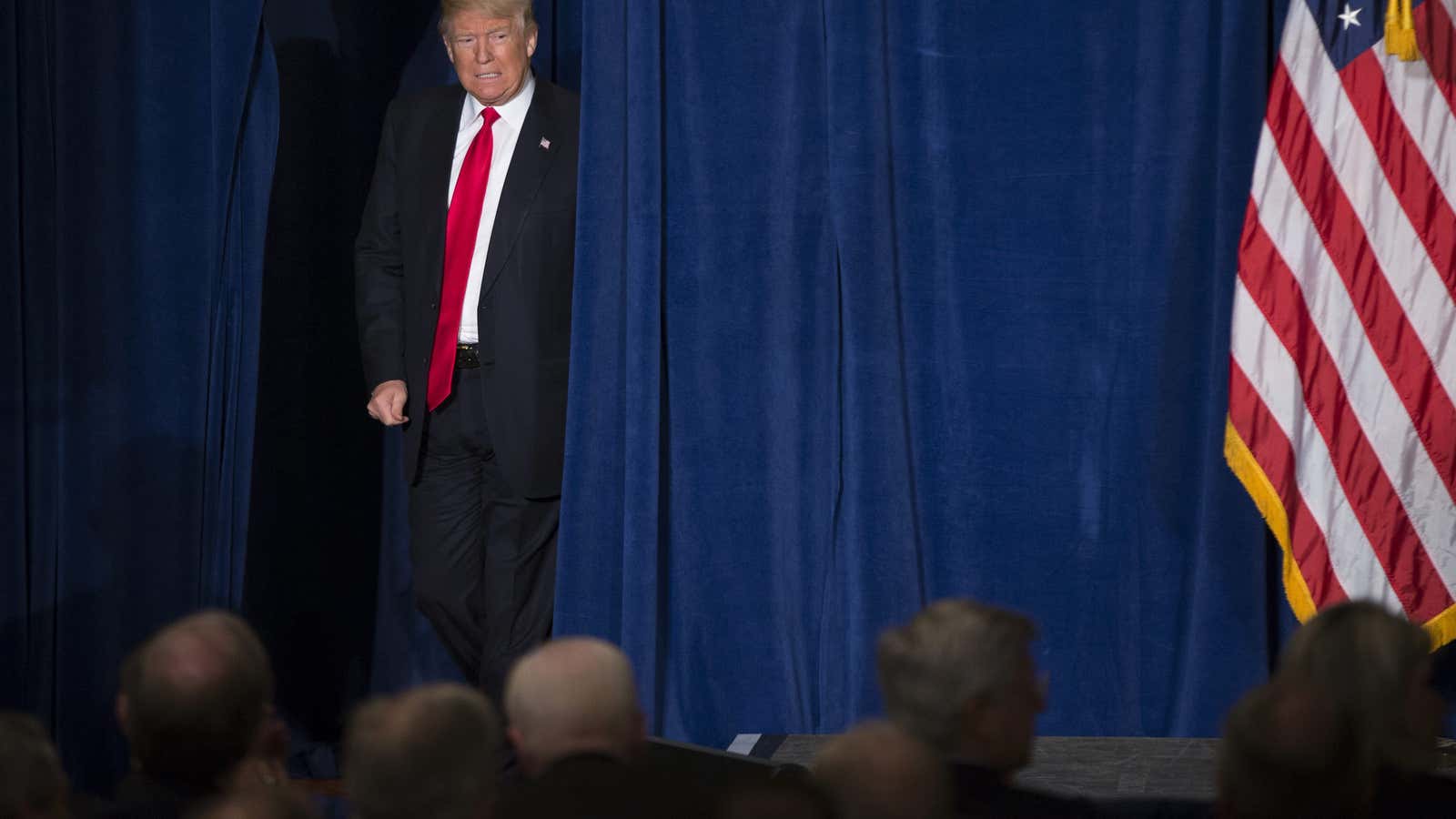Donald Trump set out today to show that he is more than an insult-spewing, vulgarity-laced real estate mogul who is stressing out foreign allies and Americans alike.
So what would president Trump do once in office? Well, if he is to be taken at his word, very much the same thing he has been saying for more than a year. His speech was a polished, re-packaged version of his familiar threats and bombast. But they were delivered with uncharacteristic presidential trappings—read from a teleprompter at a non-Trump hotel in Washington, DC.
He vowed to stop protecting NATO and Asian allies that fail to pay enough for their own defense; to ignore the “failed” American foreign policy establishment; and to mete out “consequences” against American companies that leave the country, taking jobs with them: ”We will no longer surrender this country or its people to the false song of globalism.”
Trump said his foreign policy “will always put the interests of the American people and American security first,” replacing “randomness with purpose, ideology with strategy, and chaos with peace.”
Among his first priorities, Trump said, would be to hold separate conferences with America’s NATO and Asian allies. If any ally refuses to pay its “fair” share for American military protection, the US “must be prepared to let them defend themselves,” he said. In addition, Trump said, he will initiate negotiations with Russia with the aim of securing a “great deal” on unspecified common interests from president Vladimir Putin.
Could such talks produce an agreement that meets US interests? “We will find out,” Trump said. ”America is going to be strong again. It is going to be reliable again. It is going to be a friend again.”
Trump made the speech a day after sweeping five state primaries in the northeast, moving significantly closer to securing the Republican presidential nomination.
Trump, backed by several American flags, pilloried the foreign policies of successive US administrations over the last quarter century.
He said—in a take on history that would surprise Russia along with most mainstream historians—that the US saved the world from Nazi Germany, and forced Soviet leader Mikhail Gorbachev to take down the Berlin Wall. In fact, while American troops were central to the European war in World War II, Soviet troops entered Berlin first; and Germans themselves tore down the Berlin Wall after a communications glitch among East German troops.
Once the Cold War ended, Trump said, the US lost its way. He criticized former president George W. Bush (though not saying his name) for invading Iraq, “thinking we could create western democracy” in the Middle East, and asserted that president Barack Obama had allowed ISIL to emerge as a dangerous force.
Trump also laid into Hillary Clinton, the presumptive Democratic presidential nominee, blaming her for the chaos in Libya and calling her a liar. “Our secretary of state misled the nation. She was not awake for the 3am call,” he said. The reference was to an attack that Clinton herself made in 2008 against Obama, her then-opponent for the Democratic nomination, asserting that he was not prepared for a crisis that could awake him in the middle of the night.
All in all, Trump portrayed himself as the only figure in the presidential race prepared to take on the global challenges facing the US, saying that the result would be policies “that will endure several generations.”
The talk doubled down on an interview with the New York Times almost a month ago, in which Trump rattled the global foreign policy establishment by suggesting he would step back from the foundation of post-war western security: the NATO alliance, and the web of other allies around the world protected by the US naval and nuclear umbrella. Allies, he said, will have to pony up if they wanted to continue receiving protection.
Trump’s position was seen as naive because the US maintains these relationships not as charity, but in line with a US strategic interest in reliable and stable foreign trade, including secure sea lanes, and preventing large-scale war in Europe and Asia.




